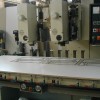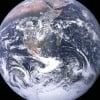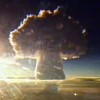Interesting facts about our Solar System
# The Sun is 330,000 times larger than the Earth.
# The moons of all other planets in the solar system are named after Greek gods, except for those of Uranus, which are named after Shakespearean characters.
Got more?that's awesome. I didn't know that about shakespearean characters.
o.k. did you know...
most of the mass of the solar system is the sun?
the sun contains 99.86% of the mass in the solar system... the sun is 73% hydrogen, so most of the matter in the solar system is hydrogen, with the remaining amount being mostly helium, oxygen and carbon.
everything else, like the metals and rocks is just a tiny fraction of a fraction of the mass in the solar system.
it's geek time for science fans. it's really amazing...
it's really amazing...The Earth weighs 5.97 times (10 to the 24th) Kg. The orbital velocity of the Earth is 30,000 m/s. The Earths kinetic energy is 2.685 times 10 to the 33rd) Joules.............This is 26 trillion times the United States annual consumption of energy.
The moon rotates at such a rate that the same side always faces the earth; this is true for some of the other planetary moons as well, for their respective planets.
Yeah, there are some cool alien critters that dwell on the back side of the moon, but we can't see them. Ha-ha!

The sun will grow so big, it will be the size of earths orbit. It won't happen for billions of years but the global warmers will win the argument that day:)
Our sun, Sol, is an average star, neither too bright nor too dim. It's just right. But if somehow we could swap out our sun for another, the effects would be dramatic.
If, for instance, we replaced our sun with our closest neighbor, the dim, red dwarf, Proxima Centauri (part of the triple system, Alpha Centauri and home of James Cameron's planet Pandora), our new sun would be dimmer than the full Moon, and our oceans would quickly freeze.
If, instead, we replaced our sun with Rigel (Arabic for "foot"), at the foot of the constellation Orion, the hunter, our world would quickly become an airless, molten rock. You see, Rigel is intrinsically 57,000 times as bright as our own sun. Heck, our planet might not remain molten for long. With that much radiation, the planet may become vaporized!
Though our sun is merely a big ball of gas, at its heart are millions of nuclear explosions going off every second. And aren't we glad the distance is just right!Jupiter's moon Io has the most volcanic activity in the solar system.
Earth's volcanoes are caused by heat in the planet's core.
Io doesn't generate enough heat to produce volcanoes. The eruptions happen because Jupiter's massive gravity tugs on the moon, while the gravity from the other moons in orbit around the planet are pulling it in opposite directions.
Little Io is being ripped apart at the seams!
Our moon was much closer and the oceans tides were literally pulled around the earth as it made its orbit. We are slowly losing our moon as it drifts further away from our planet.
You coulda fooled me two weeks ago

The moon was so big in the sky, it looked like it was going to crash into usImagine how big it looked when it was 8 times closer!
So, why do we say "The Moon" instead of "Luna?"
Like I say:
Would you name your dog Rover, and then just call him The Dog?
Why do we say "the planet" instead of "Earth?"
Earth is made of itself.
Right?
We till the earth to plant the garden
Except after a big ol' sloppy storm. Then we just call it mud.
"Earth" is like "banana".
Say it in your head real fast 25 times, and you forget what it means - it's just bunch of weird letters.
That's happening to me right now.
HAAnd so the "moon" is made of "earth" too! We look up from the "Earth" and we see the "earth."
All was as one before the "Big Bang." An apt name for a new birth, no?I've always thought "unleash" is a better word than "birth".

Here is a new Hubble shot (zoomable panorama)
http://hubblesite.org/newscenter/archiv … rmat/zoom/
"Big bang" sounds more chaotic that it actually was. It's easier (for me) to imagine the inflation.
I suppose the word "bang" doesn't mean the same thing where you're from as it does here. LOL!

You said bang.
Inflation, lots of chaos, big bang...
Who doesn't love... astronomy. We're still talking about space, right?


Well, me and my purple mug are signing off - I'm exhausted.
I've been working on my Hubble Hub:
The Evolution of Man to Telescope.
Not finding a lot of good data to back up my theory. I'm starting to wonder if somebody didn't just accidentally use the same name when the made the telescope. I think NASA should research more carefully.
Maybe I should put this in the religion forum, see how it goes over.
take it easy
It drives me nuts.

Every other moon in the system has a name, including the chunks of rock way out in the Kuiper Belt.
The research I've done on this (yes I'm that kind of nerd) shows me the moon, when it's called by name, is most often called Luna.
We should call it Armstrong maybe. At least we should put a street sign up there that says Armstrong Blvd.
Jupiter's moon Ganymede is larger than the planet Mercury.
Thanks to us untidy humans, there are currently millions of man-made ruins and metallic crap, that make up orbital "space junk." Yes, we have garbage in space!
But, I suppose it makes for a good representation of us, ya know, for any future space visitors; LOL!
If the sun suddenly disappeared in an instant, we wouldn't feel the effects on the lack of gravity from the sun for about 8 minutes... and then we would go hurtling off into space.

That is quite disturbing.
But things are so well done that we would feel the effects of that lack of gravity at the same time we'd cease to have sunlight.
We'd be still feet on earth but in a rather chaotic manner.
Imagine the whole solar system going shambles...
I'd like to contribute with these trivial facts :
The earth turns from east to west when you look from the north pole.
As it makes a complete turn roughly in 24 hours, it turns for 15 degrees per hour, wich means that a person living near the equator travels on the surface of the planet at the speed of 900 nautical miles per hour, while someone living neat the pole would only travel for about 150 nautical miles in the same time.
(arount 80 degrees latitude)
If there were an empty cavern in the middle of the earth, we could float there forever in what would appear to be an anti-gravity environment.

Throw in the heat from Earth's core and presto, we got hell. LOL!

Our Sun oscillates up and down in relation to the galactic plane. It gets pulled down toward this plane but overshoots it and is then pulled back the other way, hence the oscillations.

Both the earth and the moon "bulge" somewhat in the middle due to their rotation, as most large objects will do. Over millions of years, these bulges have caused slightly more of an increase in the transference of energy between them (tidal energy) and has resulted in the earth and the moon being tidal locked, which is why we always see one side of the moon.
Since energy is always conserved, the resulting loss of energy is also causing the moon to slowly move away from the earth.
- Deborah Sextonposted 15 years ago
0
It takes 4.3 years for light to get from the star closest to us, so we see that star as it was 4.3 years ago.
The Milky Way has a super massive black hole in the center. It's invisible and the surrounding area (Sagittarius constellation) is hidden by dust clouds. But, it was confirmed by infared analysis. It took 16 years to complete this analysis.
Everybody flee!
Just kidding we're safe. It is growing so slowly that by the time we'd be in danger, we will already have been swallowed up by the sun. So relax!

oooooh I got a few! Jupiter's gravity is so great that as it orbits around the sun, it makes to sun wobble slightly on it's axis
jupiter's magnetic feild is so powerful that when the sun's cosmic rays are distorted by them and are reflected back in the form of jovian Aurora Borealis that is many times more powerful than that of our Earth and that signals to these Aurora can be transfered into audio that you can hear on your AM radio if you go far enough away from civilization.
Miranda and Ganymade have magnetic feilds, jupiter's great red spot has been shrinking for the past 300 years,
jupiter's core consists of metallic Hydrogen and liquid Heluim, making the gas giant one hell of a magnetic powerhouse, making it's magnetic feild only comparable to that of the sun...X3Of all the facts about the Solar System, I think the most mid-boggling relates to our own Sun, and it is indicative of the vast size of our Sun. Every single second of every single day, the Sun loses 4 million tons of mass. That means in the time it's taken you to read this, the Sun has become maybe 100 million tons lighter - that's 100 million tons never to be regained - and it's been losing mass at this rate for billions of years!.
Related Discussions
- 14
Is Earth your favorite planet of the solar system?
by Ultimate Hubber 14 years ago
Is Earth your favorite planet of the solar system?If not, which one is your favorite?
- 4
What are some random interesting facts about the solar system?
by Ultimate Hubber 15 years ago
What are some random interesting facts about the solar system?
- 14
Is there life on other planets? What do you think?
by DaniellaWood 14 years ago
Is there life on other planets? What do you think?Scientific descoveries suggest that some planets are too hot or too cold for life and that others have no water and so on. But surely humans and animals canNOT be the only living creatures in the whole of the solar system...some even claim to...
- 120
Gravity of black hole.
by jerami 15 years ago
Having a wondering about it moment. I don't have an answer. That black hole at the center of our universe may not exert its pull upon the earth as much as it does on our sun. Our sun revolves around it. So it does pull upon the sun. Would...
- 14
Is our solar system about to pass through the plane of our galaxy?
by The Quiz Master 15 years ago
I read it's going to happen late 2012.This is what I read, I quote,"Unfortunately, the people who study these things say that there is very much intensified radiation along the plane of the galaxy and a concentrated gravitational field with so many astronomical bodies all lined up, and that...
- 16
Do you think that humans will one day inhabit another planet? And if so, which
by PR Morgan 10 years ago
Do you think that humans will one day inhabit another planet? And if so, which one?




















